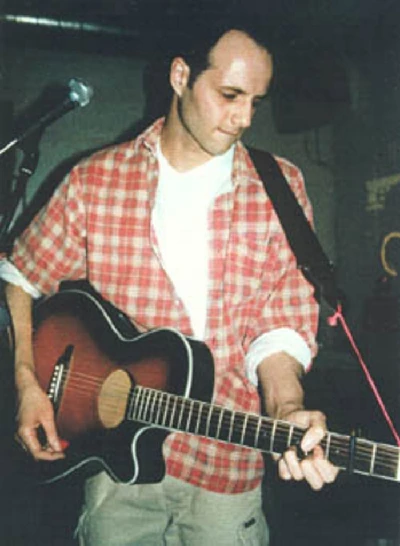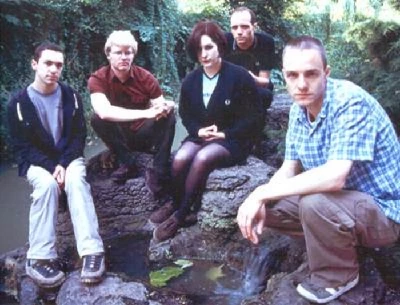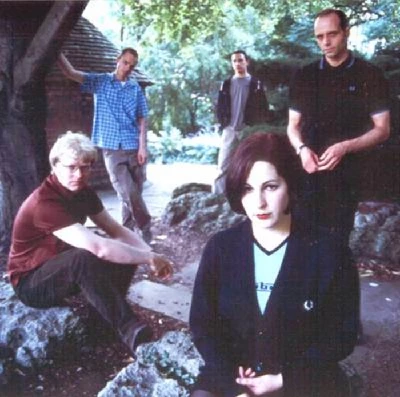published: 22 /
1 /
2002

Quiet, unprepossessing, non-drinking and incurably romantic, Bobby Wratten is the antithesis of the stereotypical rock star. Cila Warncke talks to one of the nicest men in rock about his long serving group, Trembling Blue Stars
Article
The first thing you’ll notice about Trembling Blue Stars frontman Bobby Wratten is that, well, nothing stands out. No requisite dangling cigarette, no Mick Jagger sneer, not even any Bono specs, just a very slender, slightly balding man with light hair, blue eyes and a spaniel smile; a thoroughly unprepossessing rock star. Not that Bobby would like the term rock star: too clichéd, too aggressive.
Wratten doesn’t appear to be fond of the hectic or overstated. Even on a weeknight the routine bustle of London’s West End seems to unnerve him slightly. And he only looks marginally more comfortable settled into a low-lit pub. He’s not, it turns out, drinking orange juice in deference to his slight cough; he just doesn’t drink. Most of the nervousness, though none of the soft-spoken courtesy evaporates though as Wratten begins to talk about what really interests him – his music.
Though for someone who has devoted his life to making music, Wratten didn’t have a particularly polished beginning. Wratten confesses that he and [bassist] Michael Hiscock “couldn’t even tune our guitars,” in the early days of his first band, The Field Mice. When asked how their now-cultishly-adored whispery, twee-pop style developed he smiles, “you copy the bands you like and get it wrong, so that’s where you end up.” But press on and ask what bands he liked as a youngster and he rather incongruously names The Jam, The Clash, XTC, and Joy Division.One wonders exactly what strange things have to happen to bass and guitars, etc to get – accidentally – from The Clash to The Field Mice, but then the studied innocence of Wratten’s expression hints that he’s being more than a little disingenuous. And when he adds that, “there was nothing deliberate about any of it” it seems certain that the dim light of the pub is masking a twinkle in his eye.
After all, he insists that his music is neither as sad, nor as obsessive as some might like to believe. The acrimonious break-up of The Field Mice is well documented, as is the subsequent formation of Northern Picture Library by Wratten, and fellow former-Field Mice Annemari Davies and Mark Dobson. Even more legendary is the break-up of Annemari and Bobby’s long-term relationship, which led to the dissolution of Northern Picture Library after just one album and a handful of singles.
A self-professed incurable romantic, Wratten says, “like the idea you have a soul mate,” which goes a considerable way towards explaining the raw sadness captured in many of his lyrics. “I wrote a lot of songs about Annemari,” he says, perhaps understating the case just a little. The Trembling Blue Stars debut 'Her Handwriting', released in 1994, is an unabashed hankie-wringer of a CD recording the emotional devastation that came in the wake of the split with Davies. Unsurprisingly, Wratten reports that Davies declined to sing on 'Her Handwriting', though by the time he’d written the second Trembling Blue Stars record, 'Lips That Taste Of Tears' his ex-girlfriend was ready to rejoin him in the studio.
Which he claims is not at all creepy, in an “Every Breath You Take” kind of way. “I don’t [write songs about Davies] anymore but people still think I am, it’s just kind of funny,” he says. Then by way of supporting evidence points out a lyric from the third TBS record, 'Broken By Whispers': “it goes, ‘the way we left it was you would call,’ [from 'Sometimes I Still Feel The Bruise'] which I thought made it pretty obvious that it was about someone you weren’t in contact with, but Annemari was in the studio with me when I recorded it!” What’s more, he says, they are good friends outside the studio as well; Davies minds his house for him when he’s away. Which, most recently, was on Trembling Blue Stars inaugural tour of the States. Their American label, Sub Pop funded a multi-city junket, which Wratten thoroughly enjoyed. “[We’re] treated more seriously [there]” he says; possibly, one imagines, because Americans prefer to forgo the irony that Britain almost requires of its musicians. Not that all their tour was spent in front of fawning audiences; in Portland, OR Trembling Blue Stars were booked to play a club called Dante’s – a fairly seedy gay/leather sort of club.“ There were a few people in front who were there to see us, and a lot of people who just looked confused… but there were no disasters” Wratten recalls. Playing bars and clubs also meant that the shows tended to start late, after a long day of driving (the band navigated all the way from New York to San Francisco in the course of their tour), so “you play the first song three times as slow as it should be.” And instead of throwing yourselves a backstage shindig afterwards, apparently, you pack up and climb back into the van for some kip. “We weren’t very rock’n’roll,” Wratten explains, unnecessarily.Though in a world where“quiet is the new loud”, sleeping, chatting, and hanging out at truck stops may be new rock’n’roll.
In any case, returning to Mitchum, South London was a bit of a jolt, “it felt really strange coming home to nothing… we don’t really know what happens next,” he says, betraying for the first time a sense of anxiousness. This has something to do with their bassist leaving the band at the end of the American tour, and perhaps more to do with the fact that Trembling Blue Stars have already far overreached their intended lifespan. Her Handwriting was meant to be a one off record, and now, four albums later Wratten still believes you should “treat each record like it’s the last one you’re ever going to make.” Great for raising the artistic stakes probably, but surely stressful?
“I try not to worry too much about what’s going to happen… I always assume one day I’ll have to get a proper job, just putting it off,” Wratten says unconcernedly. A notably sanguine attitude for a man who freely admits that, “I’ve never had a proper job – oh, no.” Should 9-to-5 employment become absolutely necessary, though, he’s mentally prepared, “I can see myself working in a book shop in Orkney,” he says cheerfully. “[I’m] not that ambitious really,” he adds, “I just want to survive.”
Still, he reckons that all Trembling Blue Stars need to have a hit single is, “more money,” pointing out that decidedly average indie bands such as Coldplay made shed-loads because “someone’s decided they’re going to make it.” This is, apparently, as near as Wratten comes to professional jealousy. Saying merely that “it would be quite nice” to sell more records. “A lot more people would like this [music] if they could hear it – I don’t think we’re difficult,” he says.
More importantly though, they aren’t “desperate.” “It’s quite a good thing making records in obscurity” Wratten asserts, though he admits to thinking Trembling Blue Stars “would have been a lot more successful” if they’d done market research. But, ultimately, that isn’t what he respects, “[I] like groups that know what they want to do and do it.” Whatever the future holds for Bobby Wratten and his musical compatriots, he maintains that the highest compliment he could receive is “he never sold out.” And with that he puts down the long-emptied orange juice glass he’s been fidgeting with, rises, and – emerging back into the bright lights of Leicester Square – very politely asks for directions to the Tube station.
Then he smiles and walks away, the least rock’n’roll man you’ll ever meet, but refreshing proof that the endangered romantics are not yet extinct.
Picture Gallery:-

